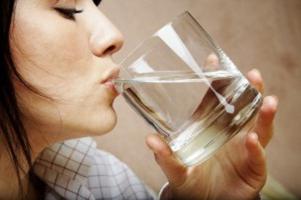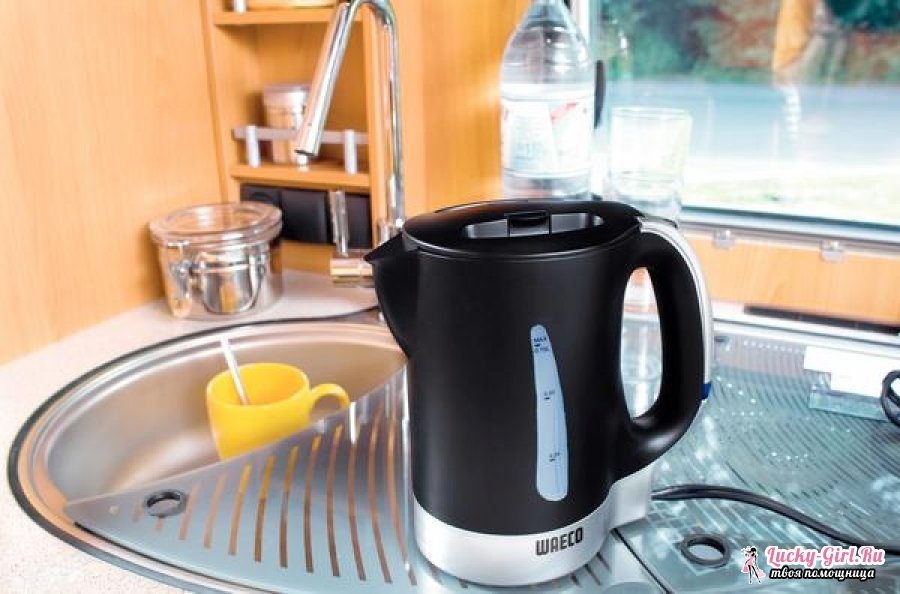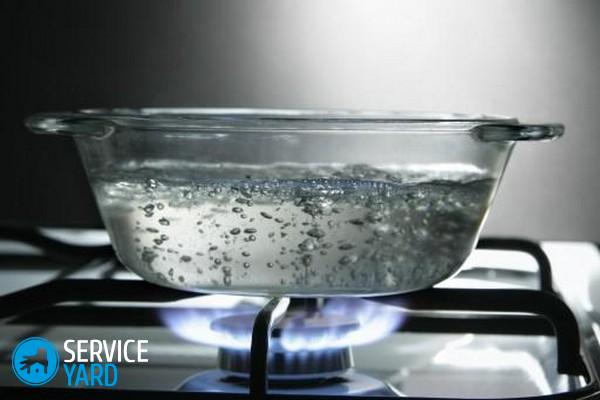Re-boiled water. Boiled water: benefit or harm?
Probably, every person already knows that water is the most important substance for the functioning of all organs and systems of our body. All doctors strongly recommend that both children and adults drink enough ordinary clean water. And no juices, compotes and other drinks can be a worthy replacement for her. But the opinion of doctors and ordinary people about what kind of water is better to drink does not always coincide. So many people wonder why you can’t boil water twice: scientific fact or confusing such an opinion about it?
Many doctors advise their patients to drink water that boiled only once. In other words, before adding new liquid to the kettle, pour the remainder into the sink. But there are people who are sure that prolonged boiling is guaranteed against various harmful impurities. Who is still right?
AT everyday life we usually use tap water. And she, as everyone knows, has a lot of different substances in its composition, including not very useful for health. It contains not only the chlorine needed for disinfection, but also various heavy compounds. Therefore, taking such water without boiling is strongly discouraged.
During the boiling of water, the formation of organochlorine compounds occurs in it. And the longer the boiling process lasts, the greater the number of such compounds is formed. They are represented by dioxins and carcinogens and are able to exert a depressing effect on the cells, tissues and organs of our body. But the negative impact will not be noticeable immediately, because aggressive substances accumulate in the body for a long time, and then lead to the development of serious, including chronic, health problems.
Probably, everyone noticed that boiled water has a completely different taste than "fresh". A similar feature is also explained by the presence of dioxins in its composition. An increase in their amount softens the water.
It is worth noting that chlorine from unboiled water is much more harmful to the body. Therefore, do not drink water just from the tap. Pediatricians even advise bathing newborns in boiled water. Excess chlorine can cause skin peeling, itching and other unpleasant consequences, especially on delicate baby skin.
What is fraught with prolonged boiling?
The answer to this question is hidden in the above information. Since the process of boiling is accompanied by the formation of dioxins, with prolonged boiling, the amount of these compounds increases. However, it is worth noting that in order to obtain their critical level in water, it will have to be boiled far more than once.
Do not forget that when boiling, the taste of water changes noticeably. Thus, the liquid boiled twice will already be far from ideal and will be able to slightly change the taste of brewed tea or coffee. Quite often, water is boiled repeatedly in different offices, when employees are simply too lazy to run away for a new portion.
Is boiling really dangerous?
A single answer to this question will not give any specialist. With each boiling carried out, the amount of organochlorine compounds in the water increases, but their level will still not rise to such an extent as to cause serious poisoning or fatal outcome. So, the most basic obvious minus refluxing consists in changing the taste of water, which spoils the drinks prepared on its basis, making it difficult to enjoy the fullness of their taste.
At the same time, scientists emphasize that the amount of aggressive particles (microbes) in boiled water decreases after the first boiling. And the re-inclusion of the kettle does not affect their viability. After all, that which could not survive when the temperature reached one hundred degrees has already died, and particles that are able to stay alive will be preserved after repeated boiling.
Boiling allows you to purify water from hardness salts, because they have a lower boiling point. Such particles settle on the walls of the kettle, like scum, which is visible to the naked eye.
Which can be said for quite some time, it is still more beneficial for the body than tap water. A decision to boil it again or not, a person must make independently, focusing on the above information. Once again, I want to emphasize that organochlorine compounds, when boiled again, still stand out, albeit in a small amount, and no one knows what this may be fraught with for the body. Therefore, it is better not to risk your health and not be lazy to change the water in the kettle for fresh.
In order for boiled water to bring the body only benefits, you need to adhere to several recommendations:
For boiling, it is worth using only fresh water each time;
- Do not boil the liquid again and add fresh to its residues;
- before boiling water, leave it for several hours so that it stands - so part of the aggressive substances and chlorine will disappear from it;
- pouring boiling water in a thermos, do not plug it with a stopper immediately, it is better to wait a couple of minutes.
Folk recipes
So, it is clear to every person how important. But the consumption of insufficient quality water can lead to the development of various pathological conditions. So, if the drinking fluid contains too many calcium salts, kidney stone formation may begin. Tools will help to cope with such a problem. traditional medicine.
So with kidney stone disease, you can use a bird highlander. Three tablespoons of fresh and chopped herbs, brew half a liter of boiling water. Insist the medicine for four hours, wrapping up well, then strain. Take half a glass on an empty stomach in the morning. Feasibility of treatment folk remedies You must definitely discuss with your doctor.
Ekaterina, www.site
Google
- Dear our readers! Please highlight the typo found and press Ctrl + Enter. Write to us what's wrong there.
- Please leave your comment below! We ask you! We need to know your opinion! Thank! Thank you!
Surely, you’ve heard that every time you need to pour new water to the kettle? Nevertheless, you do not always follow this rule. But really, what terrible can happen if you boil water several times?
To understand the problem, let's go a little deeper into the story and chemical properties water.
Without water, the human body cannot exist. Eighty percent of our bodies are fluid. Fresh water is necessary for normal metabolism, elimination of toxins from the body.
But with water in modern world there are certain problems. Not every resident of a metropolis can get the necessary amount of fluid from a well or from natural spring. In addition, we must not forget about the natural pollution of the modern world. Life-giving moisture enters our homes through kilometers of pipes. Naturally, disinfectants are added to it. For example, bleach. If we talk about cleaning systems, their quality leaves much to be desired. In some cities, they have not changed for decades.
To use this water for cooking and drinking, people came up with boiling. The reason is one - to destroy, if possible, all bacteria and microbes that are in raw water. There is a joke on this subject:
The girl asks her mom:
Why are you boiling water?
So that all microbes die.
Is this what I will drink tea with dead microbes?
Indeed, most bacteria and germs die under the influence of high temperatures. But what else happens with the composition of H2O at the moment the temperature reaches 100 degrees Celsius?
1) When boiling, oxygen and water molecules evaporate.
2) Any water contains certain impurities. At high temperatures, they do not disappear. Is it possible to drink sea water if it is boiled? At 100 ° C, oxygen and water atoms will be removed, but all salts will remain. But the most interesting is that their concentration will increase, since the water itself has become less. Therefore, seawater after boiling is unsuitable for drinking.
3) Hydrogen isotopes are present in water molecules. It's heavy chemical elementswhich are resistant to temperature increase up to 100 ° C. They settle to the bottom, "weighting" the liquid.
Is boiling dangerous?
And why do this? Bacteria died during the first boiling. There is no need for repeated heat treatment. Too lazy to change the contents of the kettle? Well, let's understand if it is possible to boil again?
1. Boiled water is completely tasteless. If you boil it several times, it becomes very, very tasteless. Some may argue that raw water also has no taste. Not at all. Do a little experiment.
At regular intervals, drink tap water, filtered water boiled once and boiled many times. All of these fluids will have a DIFFERENT taste. When you drink the last option (boiled many times), your mouth will even have an unpleasant aftertaste, some kind of metallic aftertaste.
2. Boiling “kills” water. The more often heat treatment occurs, the more useless the liquid is in the long run. Oxygen evaporates, the familiar H2O formula is actually violated from the point of view of chemistry. For this reason, the name of such a drink - "dead water".
3. As mentioned above, after boiling, all impurities and salts remain. What happens with every reheat? Oxygen leaves, water too. Consequently, the concentration of salts increases. Of course, the body does not immediately feel it.
The toxicity of such a drink is negligible. But in "heavy" water, all reactions occur more slowly. Deuterium (a substance that is released from hydrogen during boiling) tends to accumulate. And this is already harmful.
4. We usually boil chlorinated water. When heated to 100 ° C, chlorine reacts with organic matter. As a result, carcinogens are formed. Frequent boiling increases their concentration. And these substances are extremely undesirable for humans, since they provoke cancer.
Boiled water is already of little use. Reprocessing makes it harmful. Therefore, follow these simple rules:
- pour fresh water each time to boil;
- do not boil the liquid again and do not add fresh residues to its liquid;
- before boiling water, let it stand for several hours;
- pouring boiling water into a thermos (for the preparation of a drug collection, for example), close it with a stopper after a few minutes, not immediately.
Every sane person tries to monitor his body and maintain good health. Drinking is an integral and vital function. If a person can do without food for about five or seven days, then the lack of water will begin to negatively affect his well-being after 24 hours. This article will tell you about the harm and benefits of boiled water. You can find out which liquid is better to use and in what quantity. Also draw conclusions about the beneficial and harmful properties of boiled water. It is worthwhile to study in detail each factor that affects the state of drinking fluid.
Re-boiling water is most often done in the same container as before. The resulting plaque on the walls of the teapot or pan is again heated and reacts with decaying liquid molecules. All this is not only not useful, but can be very dangerous for humans.

How to protect yourself when drinking boiled water?
If you still prefer to drink heat-treated liquid, then you need to do this correctly. Observe the following conditions:
- drink water immediately after boiling, do not wait until it has completely cooled;
- after processing, pour the contents of the kettle into a separate container (preferably made of glass);
- never store water in the dishes in which it was boiled;
- regularly wash the kettle from scale and plaque;
- do not drink liquid after 2-3 hours after boiling, but rather prepare a new portion;
- periodically use raw, purified liquid.
Summary and conclusion
So, now you know what boiled water is (the benefits and harms of the product are described above). Having concluded, we can say that crude liquid is less dangerous than thermally treated. So what kind of water do you drink? Processed or not?
It all depends on the region in which you live and the condition of the tap fluid. Find out what boiled water you have. The benefits and harms of this product can be checked in a special laboratory. Recently, cleaning filters have gained great popularity. They rid the liquid of harmful compounds and fill useful properties. Drink only good water and always be healthy!
Water is one of the most unique substances in nature. It is necessary for a person every day. An important factor in its use is the purity and absence of harmful impurities. Poor water quality can be extremely dangerous for the body. Therefore, before use, it is usually filtered, frozen or boiled.
What happens to boiling water?
Each of us boils water. Some use it as a drink, further cooling. Most make tea. You can often hear that water cannot be boiled twice. There is an opinion that such a liquid becomes dangerous to humans. This is explained by the fact that even with prolonged first heating, useful trace elements disintegrate. The second boiling in water supposedly leaves nothing at all useful.
Boiling is necessary in most cases. AT tap water harmful bacteria can live. They die after 2-3 minutes of heat treatment. But it is worth noting that some dangerous microorganisms are not afraid of high temperatures. In this case, boiling is powerless to cope with the problem. Also, in this way, salts of heavy metals cannot be removed from water.
It is believed that water cannot be boiled twice because it can become "heavy." From a chemistry point of view, this is a myth. It is almost impossible to create heavy water at home. This is a complicated process. This result is affected only by long boiling for many years.
In addition, heavy water is not fatal to humans. It is relatively rapidly excreted from the body.
The quality of boiled water may depend on the type of kettle. Many people do not boil water twice in plastic electric kettles. They believe that there is a reaction with plastic. In fact, if the polymer is allowed to be used as a material in which water is heated, then it is safe.
Highly chlorinated water can cause harm to health. It already at the first heating reacts with plastic. Various dangerous substances begin to be released into the liquid. They can persist even when boiling again. Therefore, the problem is rather not in secondary boiling, but in the composition of water. Before heating in electric kettle from plastic it must be defended in a glass container.
The possibility of harm from secondary boiling can also be if the kettle is made from substandard materialto which plasticizers are added. These substances make plastic less brittle. They begin to stand out during heating. It turns out that we drink water or tea with a dose of plasticizers. Therefore, do not buy cheap Chinese appliances. Cost is a direct indicator of the quality of plastic. The service life of dummies made of safe material is 3 years. After that, it is better to replace it with a new one.
Read also: 7 Ways to Purify Home Tap Water Preparation of living water
Boiling water: myths and facts

- Some attribute the dangers of boiling to the fact that the structure of the liquid is disturbed. In order to deal with this, we recall the concept of the memory of water. It means that the liquid remembers the molecular composition of the substance originally dissolved in it. When heated, this memory is allegedly destroyed, and the water becomes dead. Official science does not recognize this fact. The scientific name for dead water is distilled. In fact, it is a liquid devoid of all impurities. It is obtained using complex technological process. Like heavy, it is almost impossible to get distilled water at home.
- Another reason that they are afraid of re-boiling is the loss of oxygen in the liquid when re-heated. It becomes smaller in the composition of the liquid already at the first heating.
- Thus, when boiling, water quality is important. Chlorinated water is dangerous, both during the first and second heating. With repeated heat treatment, the liquid does not become harder. It is softer than usual from the tap.
- Boiled water will not cause harm to health under the following conditions:
- Settling or filtering fluid. Chlorine evaporates from the water and no carcinogens will form when heated
- Proper cookware for boiling. You should not choose teapots from cheap plastic. When water is heated in it, a plasticizer is released
- Descaling the kettle. This allows you to save water from impurities that accumulate on the walls of the dishes.
Why can not boil a second time water? - Unfortunately, many do not know the answer to this question, and make a mistake every day without draining the old water from the kettle. But this ban has long been known, but most simply turn a blind eye to it in order to save water and pay for utilities. In this article you will find comprehensive information on why it is harmful to boil water several times.
Why boil water?
As you know, no one can live without water living beingbe it a plant, animal, microorganism or human. 80% of our body consists of liquid (in infants - 90%). Fresh water is simply necessary for us for normal metabolism and excretion of toxins and toxins from the body.
Unfortunately, the problem is clean tasty water in the modern world is more than relevant:
- in villages where it was previously possible to find clean springs, now they are no longer completely clean due to soil pollution;
- in the city’s water, to get to the apartment, you need to go kilometers of pipes of dubious purity.
Important! Naturally, in the latter case, the liquid is disinfected with special substances, for example, with bleach, but this spoils the taste and smell of water, and it doesn’t help much. Regarding cleaning systems - their effectiveness is very controversial, because in some cities they have not changed for several decades.
Quality Conclusion drinking water deplorable. To at least somehow correct the situation, people began to boil the liquid. The goal of this process is one - to kill all bacteria and microbes that are in raw water, that is, literally sterilize it.
Indeed, most microorganisms die under the influence of high temperatures. Then why can’t you boil the water many times, because the doctors recommend that you use only the liquid that was boiled once to make tea or coffee, be sure to pour out the old remains. To deal with this recommendation, consider the physical and chemical properties of ordinary water.
What happens to water during boiling?
Let us consider in detail what changes occur when the temperature reaches 100 degrees Celsius with the composition of Н2О:
- During boiling, oxygen and water molecules evaporate.
- Since any water contains a large amount of impurities, you should know that after boiling they do not disappear. Moreover, their concentration increases, since the liquid itself becomes smaller due to the evaporation of water molecules. Particles of dirt and salt settle on the bottom of the kettle, forming a white scale.
Important! That is why seawater, even after boiling, is unsuitable for drinking.
- All pathogenic bacteria, viruses and microbes are destroyed.
Important! It is a mistake to think that each subsequent boiling kills an increasing number of harmful microbes, viruses and bacteria. All harmful microorganisms die during the first heat treatment of 100 degrees Celsius.
- Water molecules have heavy chemical elements - isotopes of hydrogen. They are resistant to temperature increase up to 100 degrees and settle to the bottom during boiling. Thus, the liquid becomes more "heavy."
Is it possible to boil water several times?
A large number of people do not drain the old, previously boiled, liquid, and again they boil it to make themselves tea. Is it harmful to boil water a second time? - We will deal with this issue.
Boiled water is completely tasteless.
If a fresh transparent liquid already does not have a special taste, then boiled liquid loses even its remains. And if you boil water several times, then it turns into a very tasteless. To understand the difference, you can conduct an experiment:

Boiling makes the water "dead"
The more and more water is treated, the more useless the resulting liquid. When boiling, the chemical formula of H2O is violated, since oxygen leaves the liquid. Water becomes "dead."
The amount of impurities is increasing
With each subsequent boiling of the same liquid, the concentration of salts increases. Naturally, the human body does not immediately feel such changes, and the toxicity of such a liquid is a negligible percentage. But all reactions in "heavy" water occur more slowly, and deuterium, an element that is released during boiling from hydrogen, has the ability to accumulate, which brings undoubted harm to the body.
Important! "Heavy" water looks the same as ordinary water, and chemical formula It has the same - Н2О, but instead of atoms of light hydrogen (protium) it contains atoms of heavy hydrogen (deuterium).
Dogs, rats, mice and other mammalian animals die after about a week of regular consumption of such water due to the replacement in the tissues of more than 25% of light hydrogen to heavy. A person without harm to health can theoretically drink two glasses of “heavy water”. In this case, after a few days, deuterium is completely excreted.
Carcinogens form
As a rule, the water we boil for our food needs is treated with bleach. In the process of heating to 100 degrees Celsius, chlorine enters chemical reaction with organic matter, resulting in carcinogens. This is another of the significant reasons why you can not boil water again. With each subsequent heat treatment, the concentration of carcinogens increases, and these substances are known to provoke the development of cancer in the human body.
How to boil water?
Boiled liquid is already not much useful, but its repeated processing makes it harmful. Therefore, before the following procedure for heating water for tea, follow these simple rules:
- Each time, use fresh water to boil.
- Is it possible to boil water a second time? - It is possible, but definitely not necessary! Do not boil repeatedly, as well as add fresh liquid to the processed residues.
- It is advisable to let the water stand for several hours before boiling.
- Using a thermos, do not close it with a stopper immediately after pouring boiling water into it. Do it in a few minutes.
- Watch the container in which boil water. Immediately descale the kettle - you can use citric acid or vinegar.
- No need to think long about how much water you need to boil. Wait until the water gets a white tint from saturation with air bubbles and turn it off. Do not wait until it begins to seethe and splatter. Remember that the longer the water boils, the less it becomes and the higher the concentration of carcinogens. That is why you can not boil water for a long time.
Important! Boiling for more than 20 minutes completely changes the structure of water.
As you can see, the arguments as to why you can’t boil water several times quite serious. Water and food should only benefit your body. Boil the same water several times or not - it's up to you. But if in this way you can even protect your body from the accumulation of harmful substances by a small percentage, then why not try it? Especially since special efforts not required for this.


